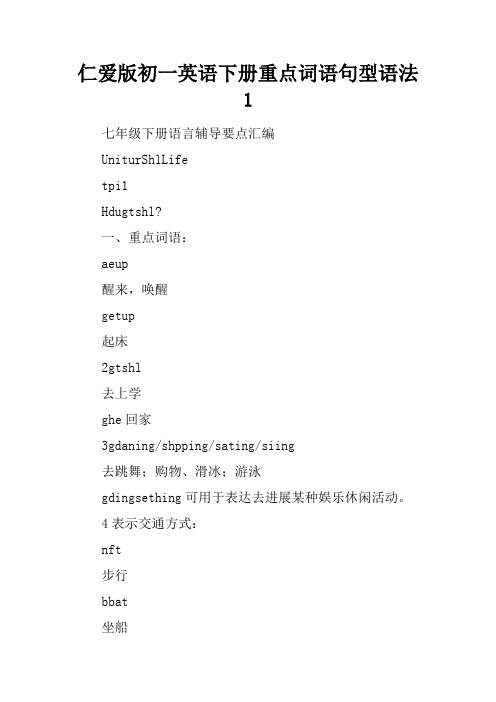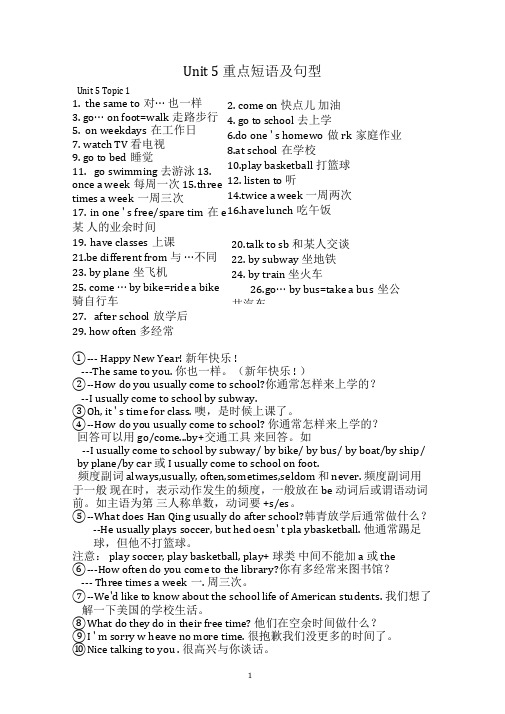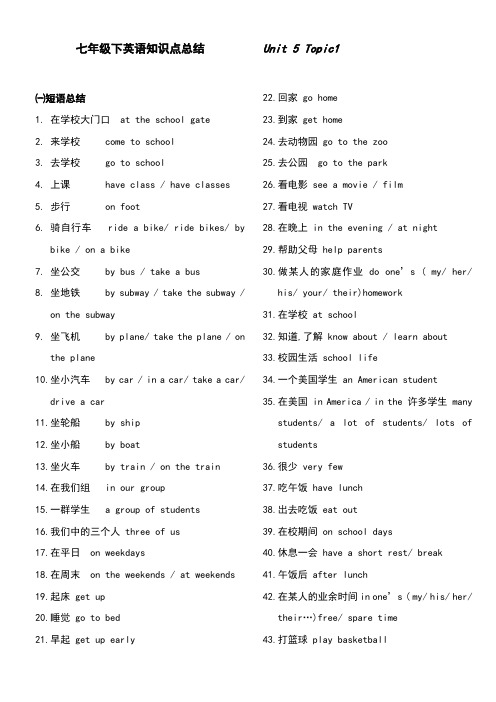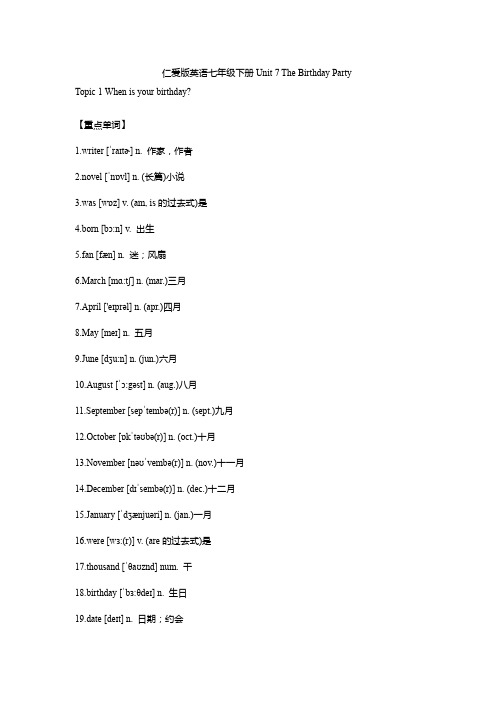仁爱英语七年级下重点短语与句型
七下仁爱英语重点句型

七下英语重点句型以下是七年级下册英语重点句型:1. 一般过去时的陈述句She was born in 1990.2. 一般过去时的疑问句Was she born in 1990?3. 现在进行时态的陈述句I am studying English now.4. 现在进行时态的疑问句Are you studying English now?5. 一般现在时态的陈述句He always helps me with my homework.6. 一般现在时态的疑问句Does he always help you with your homework?7. 一般将来时态的陈述句I will visit my grandparents next week.8. 一般将来时态的疑问句Will you visit your grandparents next week? 9. 祈使句的陈述句Please close the door.10. 祈使句的疑问句Will you close the door?11. 反意疑问句的陈述句She said that she would come to the party.12. 反意疑问句的疑问部分Did she come to the party?13. 条件句的陈述句If it rains, we will stay at home.14. 条件句的疑问句Will we stay at home if it rains?15. 比较结构的陈述句She is taller than her sister.16. 比较结构的疑问句Is she taller than her sister?17. 从句的陈述句When I was a child, I loved to read books.18. 从句的疑问句Did you love to read books when you were a child?19. 定语从句的陈述句The girl who is sitting next to me is my sister. 20. 定语从句的疑问句Which book are you reading?。
仁爱版英语七年级下册 Unit8_Topic3_短语句型归纳

Unit8 Topic3 短语句型归纳●重点短语perform lion and dragon dances 舞龙舞狮watch lantern shows 观灯展guess riddles 猜谜Lantern Festival 元宵节Mid-autumn Festival 中秋节decorate …with …用装饰……go to church 做礼拜put up挂起;举起;贴(广告等〕stay up熬夜at midnight 在午夜lucky money 压岁钱knock on/at 敲hold races 举办竞赛National Day国庆节go up升起●必备句型1. They often eat turkey and Christmas cakes and give each other presents.2. People show their love for their mothers by giving cards and other presents.3. Christmas is the most important festival in many countries.4. Children put up stockings by the fireplaces or at the end of their beds before they go to bed.5. They usually greet each other and say, “Merry Christmas!〞6. In China, the Spring Festival is a big event.7. They stay up and enjoy dumplings at midnight for good luck.8. They are very happy to get lucky money from them.9. Then we knocked on our neighbors’doors and shouted, “Trick or treat!〞10. People can enjoy a one-day holiday, too.11. Many people go to Tian’anmen Square to wa tch the national flag go up.。
2020年春仁爱版英语七年级下册词组及重点句型

2020年春仁爱版英语七年级下册词组及重点句型Unit5 Topic 1e/go to school 去上学at the school gate 在校门口2. ride a/the/one’s bike to ……sw by biketake a/the bus to …….. sw by bustake a/the ship to …….. sw by shiptake a/the boat to ……..sw by boat动词take a/the plane to ……..sw go/come to…sw by plane= by air take a/the train to ……..sw by traintake a/the subway to ……..sw by subwaydrive a/the/one’s car to ……..sw by carwalk to ……..sw on foote on 加油,赶快4.get up起床5. on weekdays /on weekends 在工作日/在周末6.do one’s (my/ his /her/our/their….) homework做家庭作业7.watch TV看电视8.in the morning/afternoon/evening在早上/下午/晚上9.play basketball/soccer/ping-pong打篮球/踢足球/打乒乓球10.see a movie看电影11.have breakfast/lunch/dinner 吃早饭/午饭/晚饭12.have four classes上四节课13.after school/class/dinner 放学后/下课后/晚饭后14. get to….到达get home到家15.go to bed 去睡觉16.go shopping/swimming/fishing 去购物/游泳/钓鱼17.listen to music 听音乐18.go to the zoo/library/park 去动物园/图书馆/公园19.meet friends 会见朋友20.read books 读书21.once/ twice a week一周一次/两次22.three times a week 一周三次23.very often很经常24. know about 了解25. the school life校园生活26. in one’s free time 在某人空闲时27. for a short time 一小会儿重点句型1.Happy New Year! 新年快乐!The same to you. 你也一样。
仁爱版初一英语下册重点词语句型语法1

仁爱版初一英语下册重点词语句型语法1七年级下册语言辅导要点汇编UniturShlLifetpi1Hdugtshl?一、重点词语:aeup醒来,唤醒getup起床2gtshl去上学ghe回家3gdaning/shpping/sating/siing去跳舞;购物、滑冰;游泳gdingsething可用于表达去进展某种娱乐休闲活动。
4表示交通方式:nft步行bbat坐船bship坐船bair乘飞机bplane乘飞机btrain坐火车bsuba搭乘地铁bar坐小汽车bbus坐公共汽车bbie骑自行车taethesuba/bus/ar搭乘地铁;公共汽车;小汽车6driveaartr=gtrbar驾车去上班taeabustr=gtrbbus乘公共汽车去上班gtshlnft=altshl步行去上学7rideabie/hrse骑自行车;骑马8aftershl/lass放学以后;下以后9plathepian/guitar/vilin弹钢琴;吉他;小提琴plabasetball/ser/ftball 打篮球;踢足球;打橄榄球plaputergaes玩电脑游戏plaithaputer玩电脑plasprts做运动0nextt紧挨着,在…旁边1aplanfshl一幅我们学校的平面图2needas在工作日ateeends在周末3havebreafast/lunh/supper/dinner/eals 吃早餐;中餐;晚餐;正餐;一日三餐havelasses/lessns/aeeting上;上;开会4athTV/vies/gaes/theanials看电视;电影;比赛;动物readnvels/nespapers/bs看小说;报纸;书ashne’sfae/lthes洗脸;衣服6反义词:up–dn,earl–late近义词:quil–fastgetupearl早起belatefr迟到7thefirst/send/third/furthda第一;二;三;四天8leanthehuse清扫房子9表示建筑物〔尤其学校建筑物〕:ntheplagrund在操场atshl/he/table在学校;家里;桌旁inaputerr/teahers’ffie/lassrbuilding/g/librar/lab/anteen在电脑室;老师办公室;教学楼;体操馆;图书馆;实验室;食堂20arundsix’l=atabutsix’l大约在六点21频率副词:never,seld,seties,ften,usuall,alas二、重点句型:It’stietgetup该起床的时候了。
(完整版)仁爱英语七年级下重点短语及句型

Unit 5 重点短语及句型Unit 5 Topic 11. the same to 对⋯ 也一样 3. go ⋯ on foot=walk 走路步行 5. on weekdays 在工作日 7. watch TV 看电视 9. go to bed 睡觉 11. go swimming 去游泳 13.once a week 每周一次 15.three times a week 一周三次17. in one ' s free/spare tim 在e 某 人的业余时间19. have classes 上课 21.be different from 与 ⋯不同 23. by plane 坐飞机 25. come ⋯ by bike=ride a bike 骑自行车 27. after school 放学后29. how often 多经常① --- Happy New Year! 新年快乐 !---The same to you. 你也一样。
(新年快乐 ! ) ② --How do you usually come to school?你通常怎样来上学的?--I usually come to school by subway. ③ O h, it ' s time for class. 噢,是时候上课了。
④ --How do you usually come to school? 你通常怎样来上学的?回答可以用 go/come...by+交通工具 来回答。
如--I usually come to school by subway/ by bike/ by bus/ by boat/by ship/ by plane/by car 或 I usually come to school on foot.频度副词 always,usually, often,sometimes,seldom 和 never. 频度副词用于一般 现在时,表示动作发生的频度,一般放在 be 动词后或谓语动词前。
仁爱版英语七年级下全部知识点总结

七年级下英语知识点总结Unit 5 Topic1㈠短语总结1.在学校大门口 at the school gate2.来学校 come to school3.去学校 go to school4.上课 have class / have classes5.步行 on foot6.骑自行车 ride a bike/ ride bikes/ bybike / on a bike7.坐公交 by bus / take a bus8.坐地铁 by subway / take the subway /on the subway9.坐飞机 by plane/ take the plane / onthe plane10.坐小汽车 by car / in a car/ take a car/drive a car11.坐轮船 by ship12.坐小船 by boat13.坐火车 by train / on the train14.在我们组 in our group15.一群学生 a group of students16.我们中的三个人 three of us17.在平日 on weekdays18.在周末 on the weekends / at weekends19.起床 get up20.睡觉 go to bed21.早起 get up early 22.回家 go home23.到家 get home24.去动物园 go to the zoo25.去公园 go to the park26.看电影 see a movie / film27.看电视 watch TV28.在晚上 in the evening / at night29.帮助父母 help parents30.做某人的家庭作业 do one’s ( my/ her/his/ your/ their)homework31.在学校 at school32.知道,了解 know about / learn about33.校园生活 school life34.一个美国学生 an American student35.在美国 in America / in the 许多学生 manystudents/ a lot of students/ lots of students36.很少 very few37.吃午饭 have lunch38.出去吃饭 eat out39.在校期间 on school days40.休息一会 have a short rest/ break41.午饭后 after lunch42.在某人的业余时间in one’s ( my/ his/ her/their…)free/ spare time43.打篮球 play basketball44.踢足球play soccer / football45.弹钢琴 play the piano46.弹吉他play the guitar47.拉二胡 play erhu48.去游泳 go swimming / go for a swim49.去划船 go boating50.球赛 a ball game / ball games51.一年四次 four times a year52.听音乐 listen to music53.读书 read books54.看报 read newspapers 55.看医生 see a doctor56.去图书馆 go to the library57.一周两次 twice a week58.见朋友 meet friends59.每天 every day60.在七点半 at half past seven61.一小会 for a little while / for a shorttime62.晚饭后 after supper63.吃饭 have dinner64.吃早饭 have breakfast㈡重要句型1.I usually come to school by subway.同义句: I usually take the subway to school.对划线部分提问: How do you usually come to school类似的有:go to school by bike=go to schoolon a bike= ride a bike to school=ride to schoolgo home by bus=go home on a bus=take a bus home2.How do you usually/ often…你通常/经常怎样…3.It’s time for class.=It’s time to haveclass. =It’s time for having class.4.What about you =How about you5.How often …询问频率,回答可以用频率副词:always, usually, often, sometimes, seldom, never, every day ,every +其他时间名词或表示频率的短语回答表示频率的短语:次数+单位时间. : once a day / twice a week / three timesa month6. The early bird catches the work. (谚语) 笨鸟先飞7. Work / Study must come first. 工作/ 学习必须放在第一位!8. Classes begin at eight. =Class begins at eight.提问: What time does the class begin / What time do the classes begin㈢重要单词的用法1.look (感官动词) 看起来,后面加形容词His mother looks very young.They look very cute.Her dress looks very nice.You look very cool in this coat.2.by 介词by 后面直接加表示交通工具的名词,中间不用任何词修饰,如:by bikeby +动词ing形式,表示通过某种方式People show love to their mothers by giving cards.You can be a good student by working hard.3.over (形容词)School / Class is over.4.begin现在分词: beginning 过去式: beganbegin to do sth , begin doing sthHe begins to write a letter. =He begins writing a letter.如果begin本身为分词,只能用begin to do sthHe is beginning to run.5.listen to 听(动作), hear 听见(结果)6.always 反义词 never7.本话题涉及的时态为一般现在时,句中常有频率副词或表示频率的短语,如果主语为三单,动词一定要用三单!(四)易错题1.You new watch ______ (look) very nice!2.Here ______(be) some news.3.Oh, come on! It’s time_____ going toschool.4.They usually go to school on________(feet).5.In my class, forty of _______(we) go toschool by bike.6.The early bird ______ (catch) the worm.7.Kangkang often _____ (ride) a bike to thepark.8.What time _____ (be)school over9.Work must come ______(once).10.It’s time ____you to get up.11.We often _____ books in the morning.12.Jill’s friend like ______(study) in ourschool.13.Mr. Wang teaches ______(we) English._____ of us like him.14.How about ______(go) out with me15.Most students go to school _____ theschool bus.16._______ do you go shopping with yourmotherA. How soonB. How farC. How oftenD. How much17.What time do you usually get up _____weekdays18.He ______ busy, so he has no time to playwith us.A. is alwaysB. seldom isC. always isD. often is19. The last class______(finish) at twelve o’clock.20. Let’s go______(boat).21. It’s time to have breakfast. (同义句) _________________________________________ _____________.22. Michael often rides a bike to school. (同义句)_________________________________________ _____________.23. I always go to work on foot. (对划线部分提问)_________________________________________ _____________.24. My mother goes shopping twice a week. (对划线部分提问)_________________________________________ _____________.25. Mary always reads books in the library. (反义句)_________________________________________ _____________.26. He usually does his homework at school. (否定句)_________________________________________ _____________.27. They often go to school by bus in the morning. (对划线部分提问)_________________________________________ _____________.28. Jane seldom watches TV on weekdays. (改为一般疑问句)_________________________________________ _____________.29. He usually has lunch at home. (对划线部分提问)_________________________________________ _____________.30. Li Ping often goes to work on foot. (同义句)_________________________________________ _____________.31. 几乎没有学生乘地铁去学校。
仁爱版英语七年级下册unit7重难点知识归纳总结

仁爱版英语七年级下册Unit 7 The Birthday Party Topic 1 When is your birthday?【重点单词】1.writer [ˈraɪtɚ] n. 作家,作者2.novel [ˈnɒvl] n. (长篇)小说3.was [wɒz] v. (am, is的过去式)是4.born [bɔ:n] v. 出生5.fan [fæn] n. 迷;风扇6.March [mɑ:tʃ] n. (mar.)三月7.April ['eɪprəl] n. (apr.)四月8.May [meɪ] n. 五月9.June [dʒu:n] n. (jun.)六月10.August [ˈɔ:gəst] n. (aug.)八月11.September [sepˈtembə(r)] n. (sept.)九月12.October [ɒkˈtəʊbə(r)] n. (oct.)十月13.November [nəʊˈvembə(r)] n. (nov.)十一月14.December [dɪˈsembə(r)] n. (dec.)十二月15.January [ˈdʒænjuəri] n. (jan.)一月16.were [wɜ:(r)] v. (are的过去式)是17.thousand [ˈθaʊznd] num. 千18.birthday [ˈbɜ:θdeɪ] n. 生日19.date [deɪt] n. 日期;约会20.calendar [ˈkælɪndə(r)] n. 日历21.plan [plæn] v. &n. 计划,打算22.celebrate ['selɪbreɪt] v. 庆祝23.party ['pɑ:tɪ] n. 聚会,宴会;党派24.fourth [fɔ:θ] num. 第四25.fifth [fɪfθ] num. 第五26.sixth [sɪksθ] num. 第六27.seventh ['sevnθ] num. 第七28.eighth [eɪtθ] num. 第八29.ninth [naɪnθ] num. 第九30.tenth [tenθ] num. 第十31.eleventh [ɪ'levnθ] num. 第十一32.twelfth [twelfθ] num. 第十二33.twentieth ['twentɪəθ] num. 第二十34.present ['preznt] n. 礼物35.shape [ʃeɪp] n. 形状v. 使成为……形状36.ball [bɔ:l] n. 球;舞会37.afraid [əˈfreɪd] adj. 担心;害怕38.star [stɑ:(r)] n. 星;明星39.mouse [maʊs] n. 老鼠40.square [skweə(r)] n. 正方形;广场;平方adj. 正方形的41.circle ['sɜ:kl] n. 圈,圆圈v. 圈出42.triangle ['traɪæŋɡl] n. 三角形43.rectangle [ˈrektæŋgl] n. 长方形;矩形44.oval ['əʊvl] n. 椭圆adj. 椭圆形的45.centimeter ['sentɪˌmi:tə] n. (cm)厘米46.Mrs. [ˈmɪsɪz] n. 太太,夫人47.cake [keɪk] n. 蛋糕【重点短语】1.be born 出生2.look at 看3.plan to do sth. 计划做某事4.have a birthday party 举办生日聚会5.the shape of ……的形状6.be like 像……7.how long 多长8.how wide 多宽e ... for ... 用……做……【重点句型】1.—When were you / was he/she born?你/他/她是什么时候出生的?—I/He/She was born on/in …我/他/她出生于……2.—Where were you / was he/she born?你/他/她在哪里出生的?—I/He/She was born in …我/他/她出生在……3.—When is your birthday?你的生日是什么时候?—May 13th.5月13号。
(仁爱版)七年级英语下册Unit-8语言点归纳

Unit 8知识点总结Topic 1Section A1. 询问天气状况的句型What’s the weather like ……?=How’s the weather……?2. What’s the weather like in spring?在表年、月、季节、上午、下午、傍晚的时间名词前用介词in在具体日期、星期或具体某天的上午、下午、傍晚前用介词on在中午、深夜、具体钟点前用介词at如:in 2009, in February, in fall, in the morning/afternoon/eveningon March 12th, 2009 , on Monday, on tomorrow /Sunday morning, on a rainy afternoonat five o’clock, at noon, at night3.It’s a good season for flying kites.是放风筝的好季节It is + n.+ for doing sth.It’s a good time to climb hills. 是爬山的好时节It is + n.+ to do sth.It is good for helping others,帮助别人是很好的It is + adj + for doing sth.It is difficult to learn English well.学好英语是困难的It is + adj.+ to do sth.4. fly kite 放风筝climb hills 爬山make snowmen 堆雪人5. in spring/ summer/ fall/ winter不加定冠词the6. ---Which season do you like best? ----I like summer best.同义句:----What’s your favorite season? ----My favorite season is summer.7. it’s hard to say很难说8. How’s the weather today?(同义句转换) What’s the weather like today?9. My favorite season is spring.(同义句转换) I like spring best.10. I like swimming because it’s interesting.(划线提问) Why do you like swimming?11. It’s cold in winter.(划线提问) How the weather in winter?Section B1. 怎样询问天气? --What’s the weather like today-- How was the weather yesterday?2. 天气的说法sunny / cloudy / windy / foggy / rainy / snowy / wet / dry / very bright.3.I t’s nice and warm.天气挺暖和的。
- 1、下载文档前请自行甄别文档内容的完整性,平台不提供额外的编辑、内容补充、找答案等附加服务。
- 2、"仅部分预览"的文档,不可在线预览部分如存在完整性等问题,可反馈申请退款(可完整预览的文档不适用该条件!)。
- 3、如文档侵犯您的权益,请联系客服反馈,我们会尽快为您处理(人工客服工作时间:9:00-18:30)。
Unit 5 重点短语及句型Unit 5 Topic 11. the same to对⋯也一样2. come on 快点儿加油3.go⋯ on foot=walk 走路步行4. go to school 去上学5. on weekdays在工作日6.do one ’ s homework做家庭作业7.watch TV 看电视8.at school在学校9.go to bed睡觉10.play basketball 打篮球11.go swimming 去游泳12. listen to 听13. once a week每周一次14.twice a week 一周两次15.three times a week一周三次16.have lunch吃午饭17. in one ’ s free/spare time在某人的业余时间18. the Great Wall长城19. have classes上课20.talk to sb 和某人交谈21.be different from 与⋯不同22. by subway 坐地铁23. by plane坐飞机24. by train 坐火车25. come ⋯ by bike=ride a bike骑自行车26.go⋯ by bus=take a bus坐公共汽车27.after school放学后28. for a short time 一段短时间29. how often 多经常① --- Happy New Year! 新年快乐 !---The same to you. 你也一样。
(新年快乐!)②--How do you usually come to school?你通常怎样来上学的?--I usually come to school by subway.③Oh, it ’s time for class.噢,是时候上课了。
④--How do you usually come to school?你通常怎样来上学的?回答可以用 go/come...by+交通工具来回答。
如--I usually come to school by subway/ by bike/ by bus/ by boat/by ship/ by plane/by car 或 I usually come to school on foot.频度副词always,usually, often,sometimes,seldom和never. 频度副词用于一般现在时,表示动作发生的频度,一般放在be 动词后或谓语动词前。
如主语为第三人称单数,动词要 +s/es。
⑤--What does Han Qing usually do after school?韩青放学后通常做什么?--He usually plays soccer, but he doesn’t play basketball.他通常踢足球,但他不打篮球。
注意: play soccer, play basketball, play+球类中间不能加 a 或 the⑥---How often do you come to the library?你有多经常来图书馆?--- Three times a week一.周三次。
⑦--We’d like to know about the school life of American students.我们想了解一下美国的学校生活。
⑧What do they do in their free time?他们在空余时间做什么?⑨ I ’m sorry we have no more time. 很抱歉我们没更多的时间了。
⑩ Nice talking to you.很高兴与你谈话。
Unit 5 Topic 21.make cards 制作卡片2.dining hall 餐厅3.swimming pool 游泳池4.do some cleaning打扫卫生5. of course 当然6. look for 寻找7.on the shelf 在架子上8. on time 准时按时9.show sb around 领某人参观10.a few 一些,少量11.at the back of 在⋯的背后12.draw pictures 绘画13. on the playground在操场上14.in the gym 在健身房15. borrow sth from sb 向某人借某物 16. look for 寻找17.have a soccer game进行一场足球比赛18. one day 有一天①--What are you doing now?你现在在做什么?②Are you doing your homework?你现在正在做作业吗?③I ’making cards. 我正在制作卡片。
④Excuse me, may I borrow some English workbooks?打扰了,我可以借一些英语练习册吗?borrow sth. from sb向.某人借某物(借入)lend sth. to sb借.某物给某人(借出)⑤How long can I keep them?我可以借(这些书)多久呢?用How long 提问,只能用延续性动词 keep 回答, keep 在这里也是“借”的意思 , Borrow和lend都是短暂性动词,不能与表示持续的时间状语连用。
如I want to borrow the book for two day s. (× )I want to keep the book for two days.(√ )⑥The girl looks for the books on the shelves那.个女孩在书架上找书。
⑦A few students are running around the playground一.些学生正在围绕操场跑步。
A few 表示一些,几个,表示肯定。
Few 表示“很少,几乎没有”表示否定。
两者都可以修饰可数名词的复数形式。
如: I have a few friends.我有一些朋友。
He is new here, he has few friends here.他是新来的,他几乎没有朋友。
⑧The boy is drawing pictures. He isn’t cleaning the blackboard.那个男孩正在画画,他不是在擦黑板。
现在进行时的基本结构是 be+v.ing, 否定形式是在 Be 动词后加 not.⑨He looks happy because he loves swimming.他看起来很高兴因为他很爱有用。
Because意为“因为,因此”引导一个原因状语从句。
⑩I also want to visit it one day.我也想有一天去参观长城。
also 意为“也”,一般放在句中; too 也是“也”,但 too 放在句子末尾,前面用逗号隔开, either 用于否定句。
如:He likes reading, he also likes swimming. (also用于句中)He likes swimming, I like swimming, too.(too用于肯定句)He doesn ’ t like swimming, I don’ t like swimming,either.(either用于否定句)Unit 5 Topic 31. think of 认为2. work on 致力于3.talk about 谈论4.be kind to sb对某人友好5.some other subjects其他一些科目6.outdoor activity 户外活动7.tell sb about sth 告诉某人关于某事8.between⋯and 在⋯和⋯之间9.from⋯ to 从⋯到⋯10. learn sth from sb 从 /向某人学习某事11. have a music class上音乐课12. the next class 下一节课13.help each other 互相帮助14. like⋯best 最喜欢15.speak English with sb 和某人说英语 16. thank you for doing sth 谢谢你做某事①What day is it today?今天是星期几?②—What class are they having? ----他们在上什么课?—They are having a music class. ----他们在上音乐课。
③What time does the next class begin?下一节课什么时候开始?④ H ow many lessons does he have every weekday?他每个平日要上多少节课?⑤I think you must like English very much. 我想你一定很喜欢英语。
⑥— What do you think of it? ----你认为它(英语)怎么样?— I don ’ t like it. Ita little difficult’s. ----我不喜欢。
它有点难。
⑦ I like history very much because it’s very interesting.我非常喜欢历史,因为它很有趣。
⑧I t ’s time for class该.上课了。
⑨— Which subject do you like best? 你最喜欢哪门科目?— I like history best.我最喜欢历史。
⑩A t school, my teachers and classmates are very kind to me.be kind to...意为“对......友好”,相当于be friendly/nice to ...。
kind也可作名词,意为“种类”,如 many different kinds of... 许多不同种类的 ......⒒I study Chinese, English, math, politics, art, history, geography, biology and some other subjects.other 指“另外的,其他的”,常与复数名词或不可数名词连用,如:I like Lucy and some other students我.喜欢 Lucy 和一些其他同学。
